boston terrier
This post may contain affiliate links to our partners such as Chewy, Amazon, etc. These purchases help us further AZ Animals' mission of educating the world's species.
Boston terriers are small black and white dogs.
In the 1870s, the English Bulldog was crossed with the (now extinct) English White Terrier, resulting in a dog known as the Hooper's Judge. Over the next few years, the dogs were crossed with English Bull Terriers, Pit Bull Terriers, Boxers and French Bulldogs. This crossing gave us the animal we now know as the Boston Terrier.
Check out all of our expert product reviews.
The Boston Terrier has a very even temperament. They are friendly and affectionate terriers that make great family pets. They are very active, love to play, and are easy to train. Learn more about the best dog breeds for families with children here.

© AZ-Animals.com
Owning a Boston Terrier: 3 Pros and Cons
| advantage! | shortcoming! |
| Great family dog <br>Boston Terriers are family friendly and usually get along well with children! | Stress to Climate <br>Boston Terriers have short coats that are not well suited to very cold climates. Additionally, they struggle in extremely warm weather environments. |
| Less shedding! | Short Nose ProblemsIn addition to difficulties with warm weather (short-nosed dogs have trouble cooling the warm air that enters their lungs), Boston terriers' short noses can lead to snoring and drooling. |
| Quiet Breed <br>Another reason Boston Terriers make great apartment dogs is that they tend to be quieter than other breeds. While all dogs bark, Boston terriers mostly reserve their barks for direct interaction. | The Gas SituationAnother by-product of the short nose is that Boston Terriers tend to be very angry dogs. To reduce gas in your terrier, monitor their diet and eliminate low-quality foods. |
history and origin
In the 19th century, Britain was keen on blood sports. Breeders mixed terriers and bull dogs in order to breed canines that could perform well in the Colosseum and mouse-hunting competitions. The Judge was a muscular and powerful dog, the result of crossings between bulldogs and the now extinct white English terriers that took place in Liverpool in the late 1860s.
In 1870, William O'Brien sold his Boston terrier, Judge, to another Bostonian, Robert C. Hooper. This pup went down in history as "Judge Hooper," the ancestor of nearly all modern-day Boston Terriers.
Judge, the ancestor of the current Boston Terrier, was described by one breed historian as a well-built dog weighing about 32 pounds. His coat is dark brindle with a white stripe across his face, and he has a square head with an almost flat muzzle – much like a modern day Boston terrier.
Boston Terrier Health and Recreation
Check out all of our expert product reviews.
Hooper bred Judge with white female Burnett's Gyp from Edward Burnett of Southborough, MA. This family tree is well known among Boston Terrier lovers as Judge and Gyp begot Well's Eph, Well's Eph begot Tobin's Kate and so on. Early in the breed's development, selective breeding transformed the large Judge-era fighter into a smaller, gentler, more attractive pet dog, originally named the Roundhead by its supporters.
In recognition of the city in which these cheerful canines were carefully bred, their name was changed to the Boston Terrier. The Boston Terrier Club of America was established in 1891, and the AKC admitted the breed's first puppies two years later.
Boston terriers have long been the pride of the city of Boston. They have been Boston University's mascot for nearly a century, and in 1979 the state legislature declared the breed the official breed of Massachusetts, calling it "The Gentleman of America."
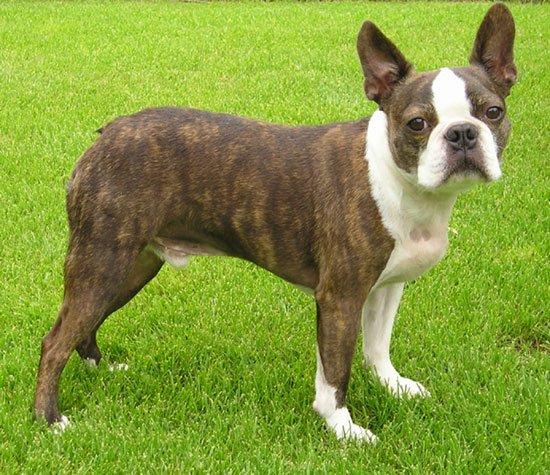
© Genie/Creative Commons
size and weight
Boston terriers are small dogs. The average height for males is 17 inches and the average height for females is slightly shorter at 16 inches. Boston terriers may fall into three different weight categories. They are: under 15 lbs, between 15 and 20 lbs, and between 20 and 25 lbs. Adult males usually weigh between 15 and 25 pounds, while adult females typically weigh between 10 and 20 pounds.
A newborn Boston Terrier puppy weighs only half a pound. However, they grow quickly, reaching an average of nearly 9 pounds at 4 months and nearly 20 pounds at 8 months of age. By 1 year of age, Boston Terriers are fully grown.
| height (male) | 17 inches tall |
| height (female) | 16 inches tall |
| weight (male) | 15-25 lbs, fully grown |
| weight (female) | 10-20 lbs, fully grown |
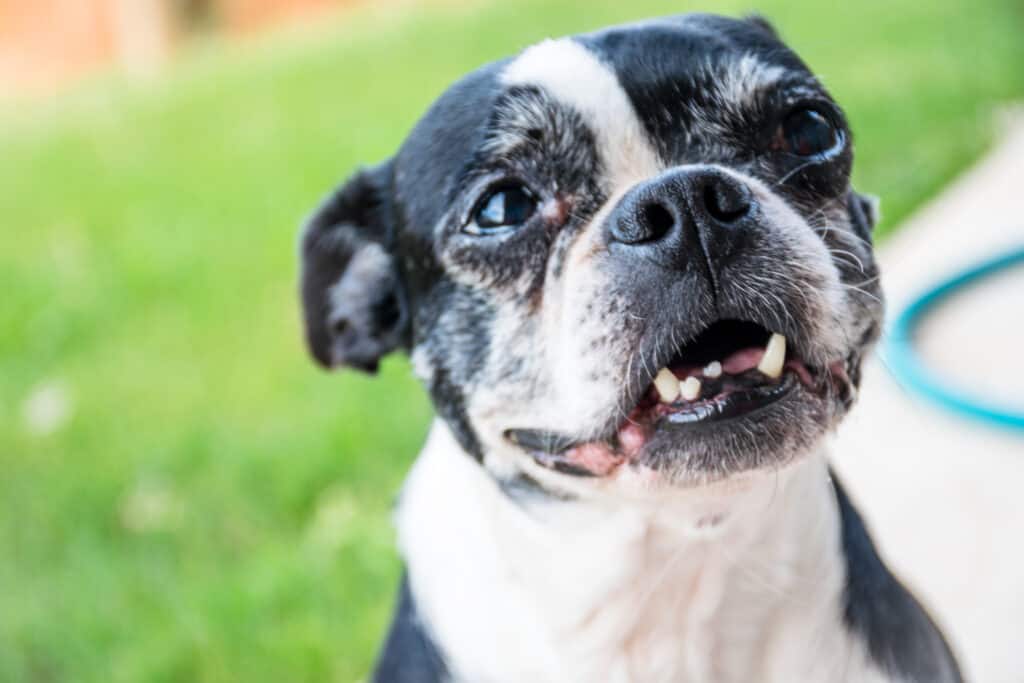
©Roschetzky Photography/Shutterstock.com
common health problems
If you have a Boston Terrier, there are some common health issues you need to be aware of. One condition that some Boston terriers suffer from is brachycephaly syndrome. Brachycephalic refers to the short, flat face of the Boston Terrier. Dogs with brachycephalic syndrome have too much soft tissue in their airways, which can make it difficult for them to breathe. Boston terriers with this syndrome may have narrow nostrils, an everted throat pouch, or an elongated soft palate. Brachycephalic syndrome is the most common health problem faced by Boston Terriers.
Another possible health problem is patellar luxation. This is a slipped kneecap that makes it difficult for Boston Terriers to walk. At first, the dog will walk without pain, but if left untreated, the kneecap can become inflamed, which can cause pain in your Boston terrier. It is a genetic disorder that sometimes requires surgery.
Since Boston Terriers have eyes that protrude from their heads, they can also hurt their eyes. They may scratch the eyeball or develop pink eye or conjunctivitis. In addition to eye injuries, Boston Terriers can also develop cataracts. This is another genetic trait that sometimes shows up in puppies as young as eight weeks old.
Some Boston terriers also suffer from keratoconjunctival sicca, a condition called dry eye. If your Boston terrier has this condition, he can't produce enough tears on his own to keep his eyes moist, which can lead to sores, itching and even infection. Another potential eye problem to watch out for is glaucoma. Boston terriers with glaucoma have a blockage in the eyeball that prevents the eyeball from draining. This can cause too much pressure, which can damage their optic nerves.
Hemivertebrae is a condition in which Boston terriers have incorrectly shaped vertebrae in different parts of their spine. A corkscrew tail is usually a sign of this condition.
Boston terriers can also have allergies, most commonly skin allergies. This may cause them to lick, scratch or chew themselves. From time to time, Boston terriers may be allergic to specific foods or other items in their home or environment, such as pollen or cleaning products.
Unfortunately, some Boston terriers also suffer from epilepsy or recurrent seizures. Seizures are caused by the round head shape and may cause the dog to tremble, twitch or foam at the mouth. In most cases, if a dog is going to develop epilepsy, the seizures will begin by age three.
A final health concern for some Boston Terriers is deafness. This is another genetic condition that can be passed on to your dog. If you think your dog can't hear you, you need to consult your veterinarian.
Keep in mind that the most common ailments with Boston Terriers may include:
- brachycephalic syndrome
- Patella luxation
- eye injury
- cataract
- Keratoconjunctivitis sicca
- glaucoma
- half vertebra
- Allergy
- epilepsy
- deaf
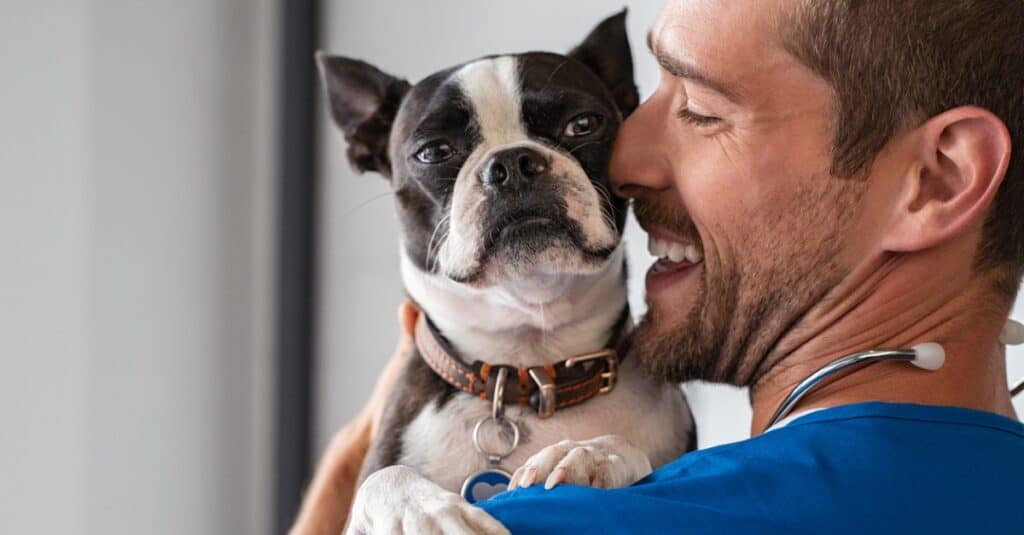
©iStock.com/Ridofranz
Temperament and Behavior
Boston Terriers have a very friendly and social personality. They are loving and affectionate towards their owners. At times, Boston Terriers can be territorial and may exhibit mildly aggressive behavior if they feel threatened by themselves or their family.
Boston terriers also display playful traits. They are energetic and love to play with their owners. The characteristics and personality of Boston Terriers make them great dogs for children, especially older ones. Boston terriers generally get along well with other dogs and cats. Where possible, it is best to introduce them to other animals that are smaller.
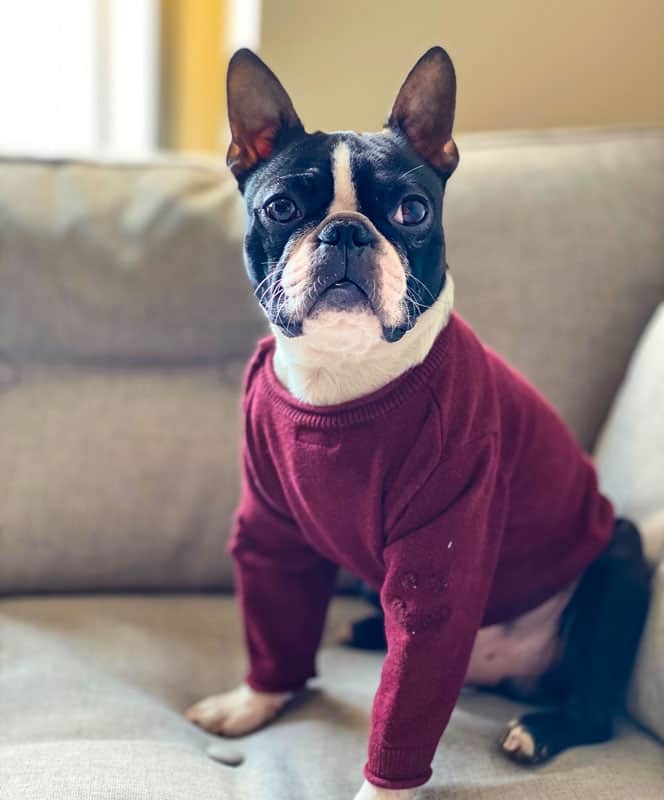
© iStock.com/Karetyna Varhanova
How to Care for a Boston Terrier
If you're considering adding a Boston Terrier to your family, there are some important considerations to keep in mind as you plan how to care for them. Boston terriers and Boston terrier puppies make great pets, but there are some special needs you need to keep in mind.
puppy food
Boston terrier puppies have a faster metabolism and need plenty of energy to help them grow. Because of this, puppies need to eat more throughout the day than adults. Very small puppies (under 3 months) should be fed 4 to 5 times a day, puppies 3 to 5 months old should be fed about 3 times a day, once puppies are at least 6 months they should be fine to eat 2 times a day Second-rate.
The food you choose for your puppy should be rich in protein and not contain too many grains (if your food choice is not grain-free, choose only high-quality grains). There is no specific allergen that is more likely to cause problems for Boston Terriers, but be sure to check your puppy for signs of an allergic reaction when starting a new food. Also, avoid foods that are too salty or sweet, as these can cause heart or weight problems in Boston Terriers.
adult food
Your dog's age, his or her weight, and how active he or she is can all affect the amount of food they should be eating each day. It is important to regulate the amount of food you feed your Boston Terrier. Boston terriers can suffer from gastritis, flatulence, and even obesity, so it's important to make sure they don't overeat. Typically, adult Boston Terriers eat once or twice a day.
Like puppies, adult Boston Terriers should be fed a good mix of protein, fat, and carbohydrates. Look for foods rich in vitamins and minerals that will contribute to your dog's overall health.
best dog food
Since every dog breed is different, you will need to plan a diet that meets the needs of your Boston Terrier or Boston Terrier puppy.
Due to potential eye and joint problems, as well as other health concerns, Boston Terrier owners should be diligent in choosing a dog food that provides all-round nutrition.
Therefore, AZ Animals says the best food to keep your Boston Terrier healthy and active is Hill's Science Diet Dry Dog Food, Adult Light for Healthy Weight & Weight Management, Small Bites.
Since Boston Terrier eyes are so susceptible to complications like keratoconjunctivitis sicca, glaucoma , cataracts, and injuries, we like that this food is fortified with vitamin A, taurine, and beta-carotene for eye health. Additionally, copper helps form strong connective tissue, and calcium helps strengthen bones, cartilage, and joints, and reduces the chances of Boston terriers struggling with patellar luxation. Additionally, there is thiamine and pyridoxine, which nourish nerve tissue in the nervous system and help prevent seizures.
Check out this product on Chewy and Amazon.
best overall
Maintenance and Grooming
Boston Terriers do shed, but not as much as some other breeds. Weekly brushing can help you remove your dog's loose hair and minimize the amount they shed. When grooming your Boston Terrier, you can use a grooming mitt, a soft brush, or other grooming tools, including this upgraded pet grooming mitt.
overall best
train
Because of their very eager-to-please personalities, Boston terriers are easier to train than many other breeds. Ideally, you should start training your Boston Terrier from an early age and make sure they are exposed to different people, places, and situations while they are young. It's also a good idea to enroll them in obedience classes when they are puppies.
exercise
Boston terriers need regular exercise, but not as much as some large dogs. A daily walk and play with you is enough for most Boston Terriers. Some energetic Boston Terriers may need a little more activity than this. Since Boston terriers can be very playful, a great way to help your dog exercise is to play with them and throw a ball or other toy for them to pick up.
AZ Animals recommends the Medium ChuckIt Ball Tosser for training your Boston Terrier.
best outdoor ball launcher
puppy
The average litter size for Boston Terriers is between three and five puppies. If you're planning to adopt a Boston Terrier puppy, there are a few things you should do to prepare the dog for it.
First, make sure you have an experienced and trustworthy veterinarian who you can take your puppy to soon after you bring it home. You'll also want to discuss the health of your Boston Terrier puppy with your breeder, and if there are any specific health concerns you should be aware of. Learn as much as you can about the puppy's parent's medical history.
Next, keep your home puppy-free. Move any shoes or other items that might attract your puppy to chew on so they don't get destroyed. Make sure there are no dangerous plants or toxic chemicals anywhere the puppy can come into contact with, and look for anything else that could endanger the puppy.
Finally, make sure you have everything you need to welcome your new puppy home. This should include puppy food, food and water bowls, leashes and collars, dog beds and toys. Plan to take at least a few days off to stay home when your new puppy arrives. Caring for a puppy is a lot like caring for a baby. They need a lot of attention and care.
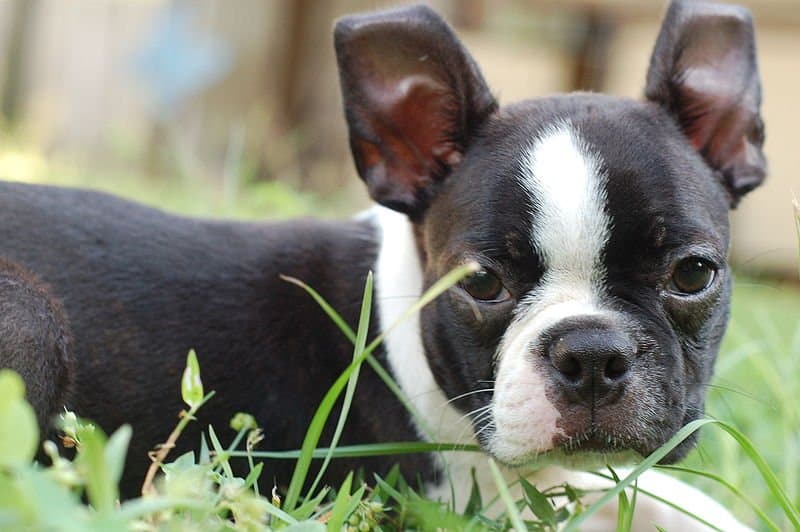
© Tricia/Creative Commons
with children
Boston Terriers make great family pets. They love to play and can be very friendly and affectionate. Boston Terriers are also accepting of other people in the house, which means they should be okay with kids having their friends over.
Because of their smaller size, Boston Terriers often get along better with older children who are more respectful of their needs and know how to be gentle. That doesn't mean you can't have a Boston Terrier if you have a toddler, but you just want to work with your toddler to make sure they know how to be gentle with a dog.
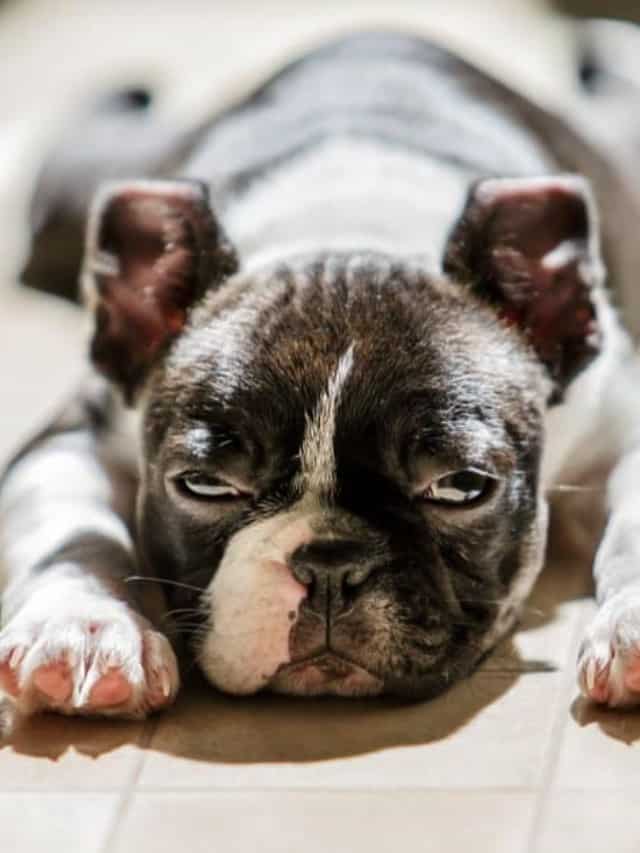
© Nailia Schwarz/Shutterstock.com
dog resembling a boston terrier
French bulldogs, pugs, and mastiffs are other dog breeds that are similar to the Boston terrier.
- French Bulldog: Both the French Bulldog and the Boston Terrier are similar in appearance. They have smaller, more wrinkled faces and are all descended from English Bulldogs. French Bulldogs have rounder ears and a more square head than Boston Terriers. Both French Bulldogs and Boston Terriers are very friendly and make great family pets.
- Pugs: Pugs are similar to Boston Terriers in that they are both very loving and social. They are good dogs for owners who are less active and can't take their dogs out on regular walks. Like the Boston terrier, the pug is also a brachycephalic dog.
- Mastiff: Although mastiffs are much larger than Boston terriers, both breeds are intelligent, easy to train, and extremely loyal to their owners. One big difference between Mastiffs and Boston Terriers is litter size. While Boston Terriers typically have a litter size of three to five puppies, Mastiffs have an average litter size of eight puppies.
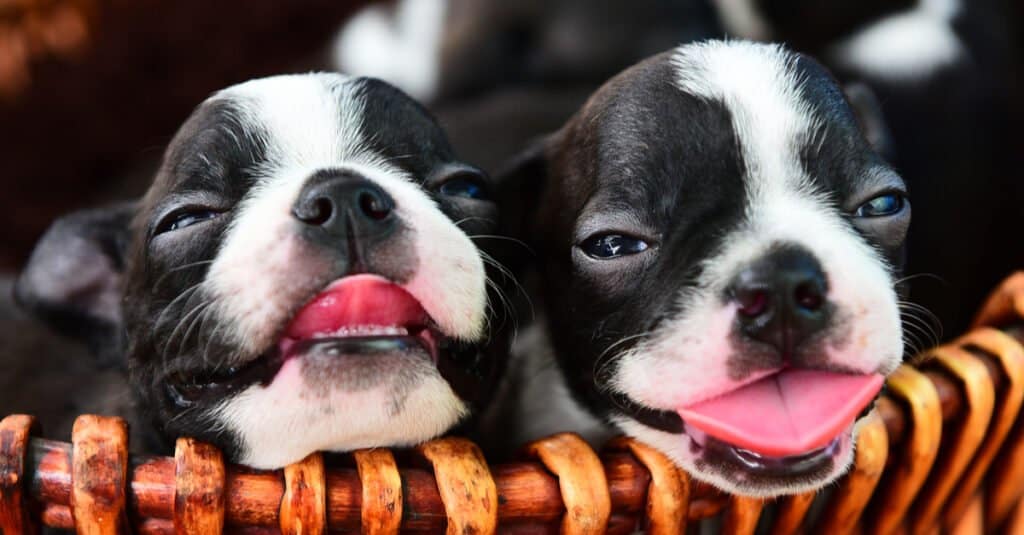
© Various Photos/Shutterstock.com
popular name
Popular names for Boston Terriers include:
- partner
- Oreo
- Molly
- Jack
- Bella
- lucy
- Cooper
- ruby
- Harley
- duke
- oliver

© Tricia/Creative Commons
famous boston terrier
Many "famous" Boston Terriers can be found in the media and entertainment industry.
- Rhett: A cartoon Boston terrier, the mascot of Boston University. His name – "Rhett" – comes from the Gone with the Wind character!
- Verna Pearl: actor Robin Williams' beloved Boston terrier. Mr. Williams has many pets and represents many environmental issues!
- Lulu: Joan Rivers is pictured with her dog in everything from a "Got Milk" ad to a Vanity Fair cover ad. One of her favorite pets was Lulu, her Boston terrier, who passed away in 2016.
See all 280 animals that start with B
Buying a Boston Terrier from a breeder can range from $600 to over $4,000. However, the average price is usually between $600 and $1,200. You'll also want to make sure to budget for food, veterinary bills, training, toys, and supplies such as leashes and food/water bowls. The average annual cost of all these items is about $1,600.
Yes, Boston Terriers are great for kids. They are very friendly, affectionate and playful. These characteristics, along with their even-tempered disposition, make them excellent family dogs.
While Boston Terriers make great pets overall, there are some downsides to owning the breed. Some Boston terriers can suffer from a number of health problems. If your dog wasn't obtained from a reputable breeder, you run the risk of having more health problems that won't be disclosed to you.
Another downside to owning a Boston Terrier is that they can be easily angered. They also make a lot of wheezing, snorting, grunting and snoring. You'll also need to plan for several months to train your dog, which can be frustrating for some.
No, Boston Terriers don't bark very often. If Boston terriers do bark, they will usually produce a lower bark rather than the loud bark that some other dogs make.
While your Boston terrier definitely prefers being at home with you, they can also be left alone. Try not to leave them alone for more than eight hours, and always make sure they are in a safe place when they are alone. A crate or a completely dog-free area is a safe place for your Boston terrier when he is home alone.
Boston terriers and French bulldogs both look very similar, with relatively small, wrinkled faces. However, there are some key differences between the two breeds. Boston terriers have pointed ears and a rounder head than French bulldogs. Boston terriers are a little taller and less muscular than French bulldogs.
Another major difference between Boston Terriers and French Bulldogs is their color. Boston terriers usually come in black and white, while French bulldogs come in more colors such as white, cream or brindle.
Boston terriers are omnivores, which means they eat both plants and other animals.
Boston terriers belong to the animal kingdom.
Boston terriers are mammals.
The Boston Terrier belongs to the phylum Chordate.
Boston terriers belong to the canine family.
Boston terriers belong to the order Carnivora.
The Boston Terrier belongs to the genus Canis.
The Boston Terrier is covered in fur.
The average number of babies for a Boston Terrier is 4.
The scientific name of the Boston Terrier is Canis lupus.
Boston terriers are larger than border terriers, and their breed originates from different places. Also, the border terrier has a rough and shaggy coat while the Boston terrier has a smooth coat.





